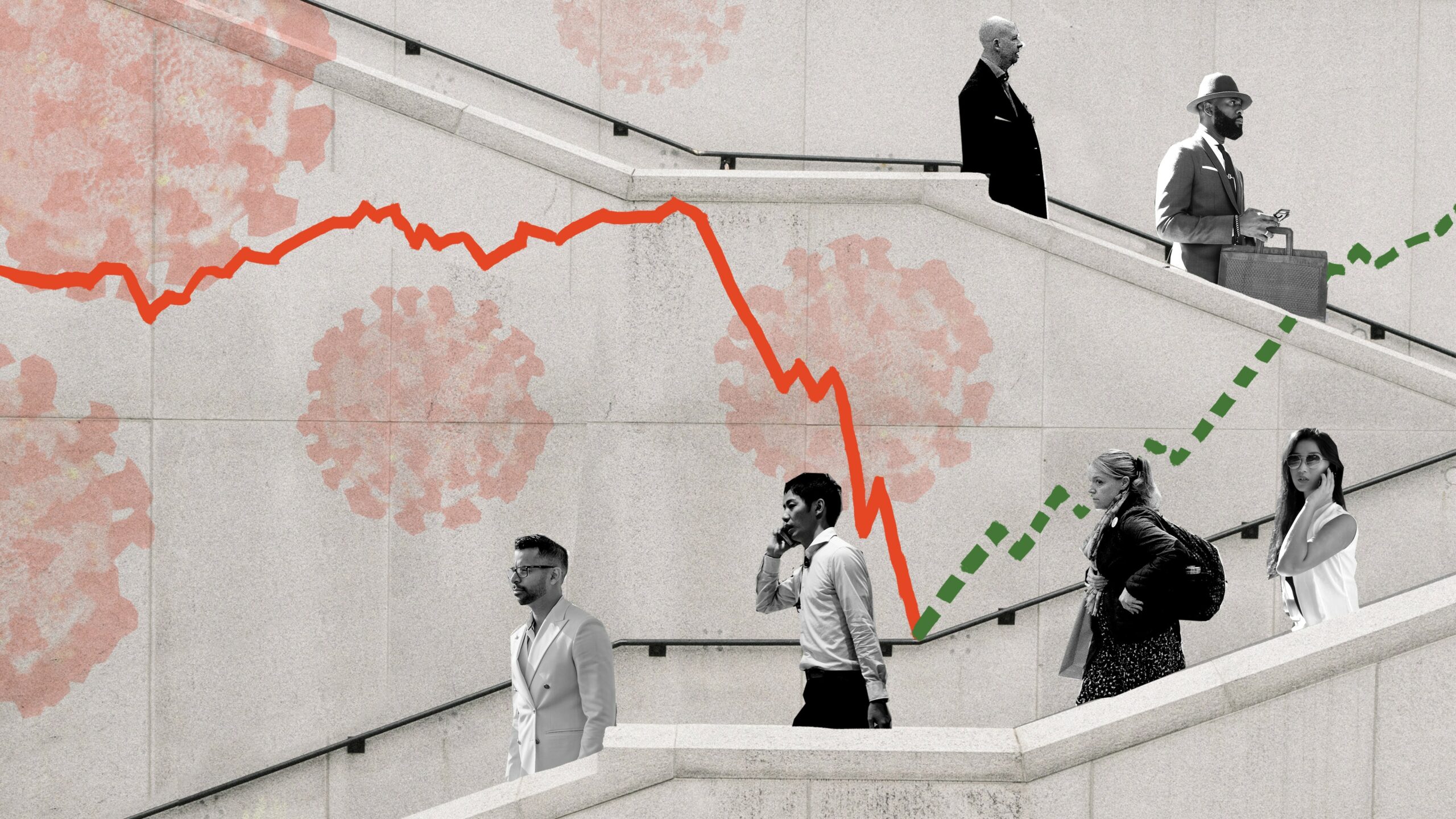Sandra Peter and Kai Riemer

The oil industry on Corona Business Insights
How the slump in oil prices during the COVID-19 pandemic presents a stress test for the oil industry in a low-carbon future.
As COVID-19 sets out to change the world forever, join Sandra Peter and Kai Riemer as they think about what’s to come in the future of business.
Shownotes
An unprecedented plunge in oil demand will turn the industry upside down
Coronavirus has exposed the problems with Big Oil
CNBC analysis of the potentially irreversible effects if the oil crisis
About 150-years of oil-price history in one chart
This episode is part of a podcast series covering what COVID-19 will mean for the business world, where we look at the impact on the economy, businesses, industries, workers and society. This is part of our ongoing coverage of the impact of COVID-19 on the future of business.
Follow the show on Apple Podcasts, Spotify, Overcast, Google Podcasts, Pocket Casts or wherever you get your podcasts. You can follow Sydney Business Insights on Flipboard, LinkedIn, Twitter and WeChat to keep updated with our latest insights.
Send us your news ideas to sbi@sydney.edu.au.
Dr Sandra Peter is the Director of Sydney Executive Plus and Associate Professor at the University of Sydney Business School. Her research and practice focuses on engaging with the future in productive ways, and the impact of emerging technologies on business and society.
Kai Riemer is Professor of Information Technology and Organisation, and Director of Sydney Executive Plus at the University of Sydney Business School. Kai's research interest is in Disruptive Technologies, Enterprise Social Media, Virtual Work, Collaborative Technologies and the Philosophy of Technology.
Share
We believe in open and honest access to knowledge.
We use a Creative Commons Attribution NoDerivatives licence for our articles and podcasts, so you can republish them for free, online or in print.
Transcript
This transcript is the product of an artificial intelligence - human collaboration. Any mistakes are the human's fault. (Just saying. Accurately yours, AI)
Intro From the University of Sydney Business School. This Sydney Business Insights.
Sandra And this is Corona Business Insights. I'm Sandra Peter.
Kai And I'm Kai Riemer.
Sandra And with everything that's going on with COVID-19, it's difficult to understand the impact this will have on businesses, on work, on society and on the economy. In this series, we try to unpack some of these effects.
Kai And today we're talking about oil, big oil.
Sandra For weeks we've seen oil prices going down. And about a week ago, we've seen headlines across the world with oil prices below zero for the first time in history.
Kai So we thought we'd look into how oil and the oil industry is being affected by this crisis and what it might mean for the oil industry going forward.
Sandra To understand these recent developments, it is quite useful to go a little bit into history and understand the structure of the oil industry as it is today and why what's happening today was unthinkable, but now seems to be the new normal.
Kai So important here is to understand the dynamic worldwide and who are the biggest producers. Interestingly, the US, who once was one of the largest producers of oil in the world, fell back as oil reserves dried up, but came back with innovation in shale oil extraction, which became really prolific round about 2015 and was so successful that in 2018 the US once again became the largest producer of oil in the world.
Sandra That means that back in 2018 America actually overtook countries like Saudi Arabia and Russia that had dominated the oil markets since the 1970s. Saudi Arabia and Russia had previously entered into a precarious alliance known as OPEC Plus, that since 2016 tried to provide the counter to the American shale oil that was coming into the market. And in 2020, as the economy started to slow down as a result of COVID-19, Saudi Arabia and Russia failed to agree on a course forward as the price of oil was falling. The proposal had been for them to cut production in an attempt to prop up oil prices. But failing to agree, early March a price war between the two had started.
Kai Now, interestingly, it was the OPEC Plus alliance that kept US manufacturers in business as the Saudis and Russia went for profits, prices were kept propped up. Which meant that shale extraction, which is more expensive generally than conventional oil extraction, was being profitable. But now, with the plummeting consumption due to COVID, and the breaking up of the Russia-Saudi alliance, whereby Saudi Arabia cut its prices to flood the market and go for increasing its market share, oil prices started to unravel faster than any time in the history before.
Sandra So even though the US and OPEC Plus did come to an agreement a couple of weeks ago to cut global supplies by about 10 percent, which would've been about 9.7 million barrels a day from May until the end of June.
Kai But this deal was not nearly enough because consumption due to COVID-19, less air travel, less car travel, changes in lifestyle, less industry production amounted to about a drop of 30 percent consumption worldwide.
Sandra That is about three times as much as OPEC had decided to cut supply by. So this all resulted in a perfect storm. So about a week ago, prices fell below zero. To understand that, it's important to understand that oil is actually traded on futures contracts. Those contracts in which people usually expect that the price of oil will go up, ran out last week, and the traders weren't able to sell the oil to anyone else. That meant that they had to take possession of it, and that meant that they had to store it somewhere. The problem was that storage space was in short supply, there was nowhere to store it. Hence, even oil tankers at sea were full of oil, so they had absolutely nowhere to go. So at this point, people started to have to pay people to take the oil off their hands.
Kai So while this below zero price is certainly an artefact of how oil is traded, what is important to remember is that a barrel of oil now hovers around the $20 mark, and it might even fall as low as $10 a barrel. And that's important because most US manufacturers will break even at about $40 a barrel.
Sandra So let's take stock at what that means first in the short term and then in the long term. Because in the short term, obviously, for many US producers, where the shale oil sector needs the $40 a barrel to stay in business, a lot of these producers actually face bankruptcy.
Kai We have already seen bankruptcies to the point of 50 percent of producers going out of market last year. And it's important to note that the US oil market has hundreds or thousands of small producers, many of which are not diversified like the large conglomerates, who can compensate for losses in oil extractions with other business fields. And many of those are now threatened to go bankrupt if prices stay low at $10 or $20 a barrel.
Sandra And just to put this in perspective, prices are extremely low. Research by Deutsche Bank looking at oil prices going back to 1870 found that a barrel of oil last week was cheaper now than at any time in history since then.
Kai Speaking of history, you find some interesting information why previously oil prices had never fallen below zero.
Sandra As we were researching this podcast, we asked ourselves, well, what happened during the last depression? And interestingly, in the 20s, producers decided to not actually take the zero or below zero price. So the only option left to them, if you cannot store this, is to actually set it on fire. Of course, terrible environmental consequences. But they did set the oil on fire rather than have to reduce the price.
Kai Fortunately, we're not in this position anymore, which led to the below zero price. But let's take a look at what this means more globally, because not only will the American producers be in trouble, there's many countries with poorly developed infrastructure and high costs, such as Nigeria, Angola, Venezuela, who might be in deep trouble if prices stay so low. And on top of this, which is important to look forward, is that the narrative around the US oil industry as an innovation industry, as one that has provided quick returns on investment over the past five to 10 years, might actually change. And banks are now creating their own oil companies because once bankruptcies happen, they might have to actually operate the seized assets from these bankruptcies. So there's a big change in the financing on this industry.
Sandra And this points to what has been, by many, regarded as the most consequential impact of this crisis, and that is the risk to maintaining investors in this industry. Whilst for a very long time, the stories, the narratives that were told about the oil industry have been those of innovation, as you mentioned, and resilience. Now the narratives have turned towards fragility, towards thinking about the returns that can be gained from this, especially in light of the looming structural changes to the industry because of a transition to low carbon forms of energy.
Kai And so importantly, many see this now as the real stress test for what might happen once the world shifts to low carbon alternatives. And interestingly, many of the companies in the US oil industry have always done their stress testing with a $40 a barrel bottom of the market, conveniently located around their profitability price, when in fact, it turns out now that we might see $20 a barrel as a price that some producers in the world can survive on. Which means that looking forward as the world moves to low carbon alternatives, the scenario we're seeing right now might be much closer to reality to what the industry has previously thought it would be.
Sandra So it does remain to be seen how long this pandemic would last and how much capital people are willing to invest to prop up this industry, especially in places like the US, and whether or not this will be a case of panic and neglect.
Kai Or it might indeed be that the narrative around the oil industry changes as a result of COVID-19, and the transition to renewable energy gets a boost from this and is sped up as oil is increasingly seen as a risky investment.
Sandra And this is where we want to leave you today and we'll make sure to include all the links in the shownotes.
Kai Until next time on Corona Business Insights.
Sandra Thanks for listening.
Kai Thanks for listening.
Outro From the University of Sydney Business School, this is Sydney Business Insights, the podcast that explores the future of business.
Close transcript















